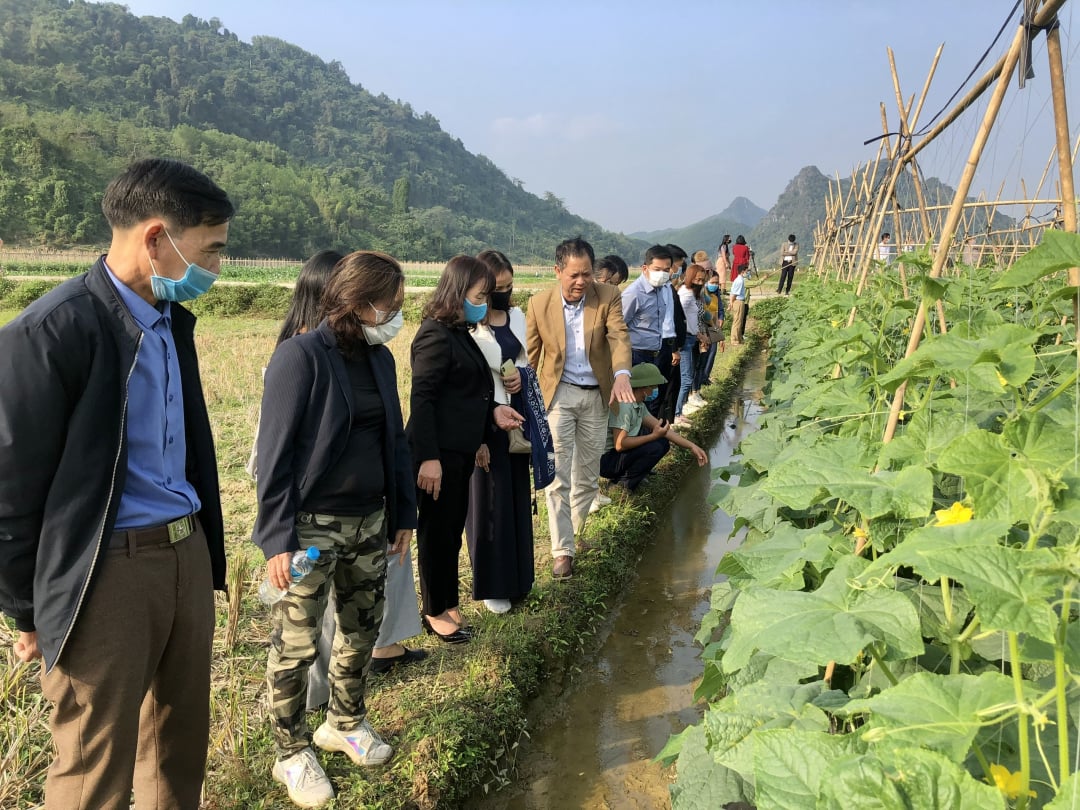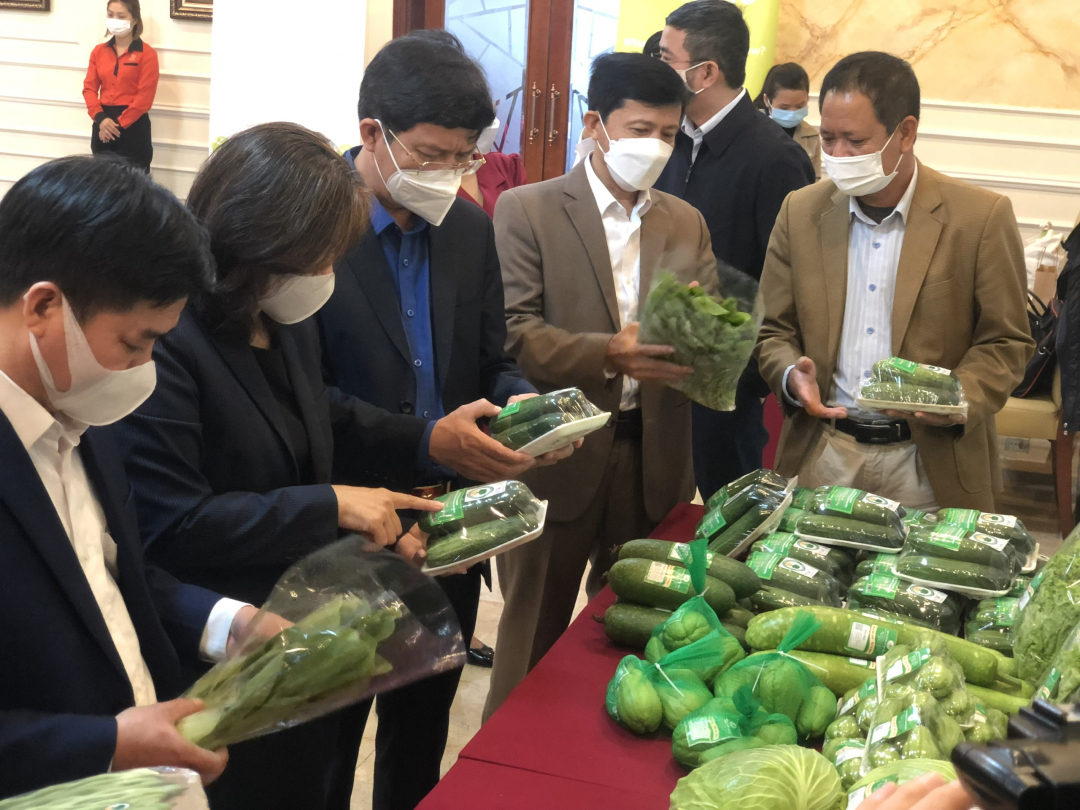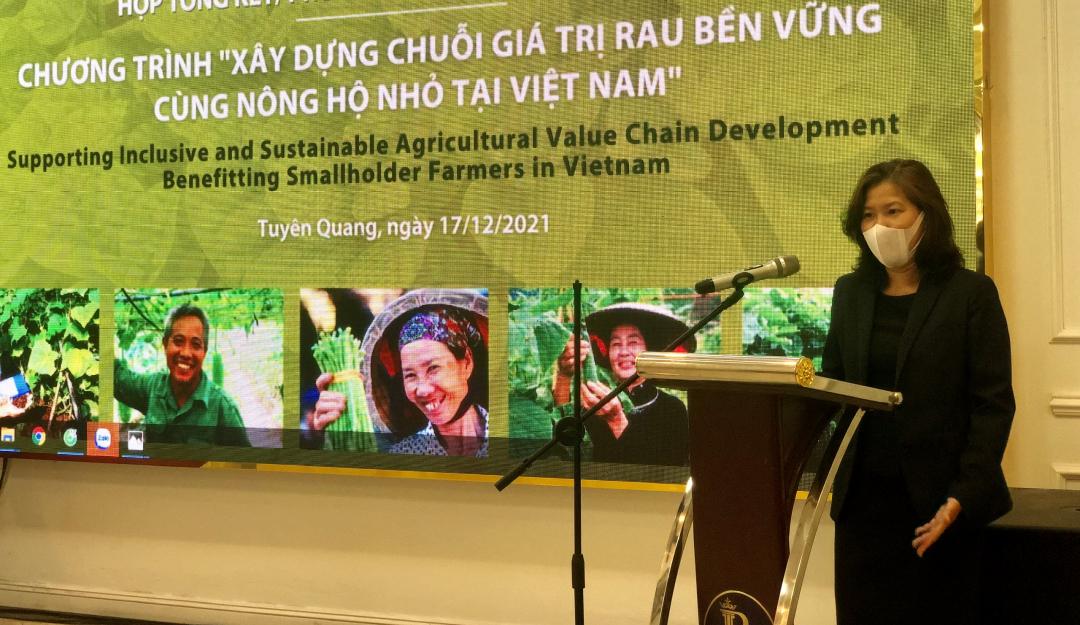November 27, 2025 | 14:41 GMT +7
November 27, 2025 | 14:41 GMT +7
Hotline: 0913.378.918
November 27, 2025 | 14:41 GMT +7
Hotline: 0913.378.918
The program "Building a sustainable vegetable value chain with smallholder farmers in Vietnam" for the 2017-2021 period is implemented by provinces and cities including Hanoi, Da Nang, Vinh Phuc, Tuyen Quang, and Ha Nam, coordinated with Rikolto In Vietnam ('Rikolto').

The volume of safe vegetables produced reached 14,000 tonnes, more than 50% compared to the expected (8,500 tonnes).
The total areas applied to the PGS (Participatory Guarantee System) model have increased by 3 times after 5 years of program implementation. It has exceeded expectations, rising to 228 hectares compared to the original plan as 70 hectares. The number of farmers directly benefiting from the program is 1,258 people.
The volume of safe vegetables produced reached 14,000 tonnes, more than 50% compared to the expected (8,500 tonnes). The vegetable quantity for collective consumption reached 6,000 tonnes, increased by 1.5 times than expected (4,000 tonnes).
The results of cooperatives' fruit and vegetable samples that participated in the inspection from 2017 until now show that all cooperatives have met the quality criteria for food safety. As a result, an estimated 200,000 consumers have benefited from the program.
Four provinces have issued PGS implementation guidelines for safe vegetables locally, including Ha Nam, Vinh Phuc, Hanoi, and Da Nang provinces. It is evidence that the recognition and application of PGS as an effective and reliable quality assurance tool by localities while creating a favorable environment for management agencies, organizations, and individuals wishing to access, learn and apply PGS in production.
The application of PGS in production areas has helped strengthen the quality control of safe vegetables, raise awareness, roles, and responsibilities of farmers in the safe production, contribute to protecting the ecological environment, and especially form group linkages among smallholder farmers to increase competitiveness in product consumption.
Some farmer groups have split up to form cooperatives or found a stable and beneficial product consumption channel, such as farmer groups in Dang Xa commune, Gia Lam district, Tien Le commune, Hoai Duc district.

The program "Building a sustainable vegetable value chain with smallholder farmers in Vietnam" for the 2017-2021 period is implemented by provinces and cities including Hanoi, Da Nang, Vinh Phuc, Tuyen Quang, and Ha Nam, coordinated with Rikolto In Vietnam.
Typical success in developing and expanding the model is An Hoa Agricultural Service Cooperative Trading in agricultural products, Tam Duong district, Vinh Phuc province. This is one of the first three cooperatives supported by Rikolto in Vinh Phuc province.
From an average output of 4-5 tonnes per day in 2018, the Cooperative has now increased to 10-20 tonnes. The members of the Cooperative's Management Board are equipped with knowledge of production organization, search for markets, have better managed the activities of the cooperative, created more jobs, and increased incomes for participating members, develop a variety of products and serve a wide range of customers such as collective kitchens, processing companies, supermarkets, etc.
Due to the increased customers, the Cooperative has expanded the raw material areas to neighboring areas and Tuyen Quang province, with nearly 300 participating households. The total areas have reached 100 hectares per year, mainly in Son Duong, Na Hang, Son Duong, Yen Son, and Chiem Hoa districts.
These are the places where ethnic minorities gather, from which the Cooperative has helped people increase their income and develop sustainable livelihoods, contributing to changing the local crop structure and creating a production-consumption chain.

The conference summarizing the program "Building a sustainable vegetable value chain with smallholder farmers in Vietnam" for the 2017-2021 period was held in Tuyen Quang province on December 17, 2021.
However, the program still has some shortcomings, such as the limited capacity of some cooperatives, leading to a lack of synchronization in the implementation of PGS in some places. In addition, the cooperative's ability of market connectivity is facing many difficulties; some areas have not been closely linked with businesses to create a sustainable value chain and have not yet attracted the participation of young people.
Mrs. Hoang My Lan, Regional Director of Rikolto, said, "In the past 5 years, we have focused on connecting producers, promoting the production of vegetables and safe products to connect with the market".
“In the coming time, we will focus on building a smart food city, which will target the producer group and the consumer group at schools and traditional markets. And we very much look forward to working with business cooperatives or enterprises to be the locomotives to link and connect the overarching chain with the manufacturing industry to have a broader impact,” said Mrs. Lan.
In addition, Rikolto will also promote working with multilateral parties to jointly come up with solutions to meet the needs of all parties in terms of production, processing, and state management to ensure that people produce safe, sustainable, and affordable. From there, all consumers have access to these products.
Translated by Ha Phuc
/2025/11/26/4909-2-154329_878.jpg)
(VAN) Pearl grouper farming in HDPE cages not only delivers economic efficiency but also contributes to protecting the environment, creating jobs, and promoting marine-based experiential tourism.

(VAN) The model of making a living under the forest canopy through the agroforestry system in Van Son commune, Bac Ninh province, is expected to generate an annual income of approximately VND 30 million/ha.

(VAN) Many enterprises in Can Tho are harnessing natural energy and reducing greenhouse gas emissions in their production processes, thereby contributing to the promotion of a sustainable green transition.
/2025/11/24/3536-2-112800_176.jpg)
(VAN) Dong Nai now has tens of thousands of hectares of forests certified for sustainable management, and this area will continue to be expanded in the coming period.

(VAN) Vinh Ha hamlet (Dai Xuyen commune, Hanoi) is shifting away from small-scale farming as households adopt bioscurity into their breeder chicken models.

(VAN) Heavy rains make aquatic species more vulnerable to disease. Proactive water management and high-tech systems help farmers prevent outbreaks and protect yields.

(VAN) Greenhouses are shifting production mindsets in Binh Lu commune, enabling farmers to ‘weather the sun and rain’ and secure stable vegetable harvests throughout the year.